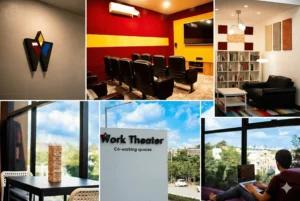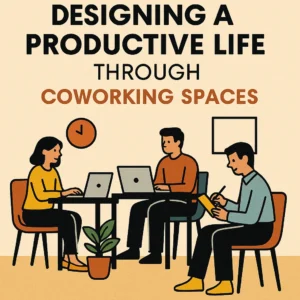Looking to move into a new office space? Here’s how to select an office space, a blog that will help you find the right space for you.
In the life of a growing business, few decisions carry as much strategic weight—and subtle emotional charge—as choosing the right office space. This isn’t just about square footage or location on a Google map. It’s about designing the physical epicenter where your team will create, iterate, and build value for years to come.
This post isn’t a checklist. It’s a layered framework to help you think clearly about one of your company’s most silent yet defining decisions.
Why Office Space Matters More Than You Think
Most founders treat office selection as a logistical step. A box to tick. But in truth, it’s a deeply strategic decision with long-term compounding effects.
Think of your workspace as:
- A productivity multiplier
- A cultural amplifier
- A brand touchpoint
- A financial liability or asset, depending on your judgment
- A platform for serendipity—team bonding, client interactions, and innovation
Whether you’re a team of five or fifty, where you work influences how you work.
Begin with Clarity: What Do You Want Your Office to Enable?
Before exploring properties or browsing listings, step back and ask:
- What is the purpose of your workspace?
- Do you need deep focus zones, collaborative energy, or flexible team pods?
- Will you host clients frequently or operate in a heads-down builder’s cave?
- Is scalability more important than design aesthetics?
This first-principles clarity helps filter out 90% of bad options. It turns guesswork into strategy.
1. Location Isn’t Just Geography—It’s Accessibility, Energy, and Talent Flow
The classic mantra “Location, location, location” still applies—but with nuance.
- Accessibility: Can your team, vendors, and clients reach the space effortlessly? A central or well-connected address can reduce commute fatigue and elevate morale.
- Surroundings: Is the energy outside your office vibrant, creative, calming, or chaotic? This subtly shapes your team’s state of mind.
- Talent Magnetism: Offices near education hubs, startup clusters, or vibrant neighborhoods can help attract sharper talent.
For example, if you’re considering a coworking space in Bangalore’s Outer Ring Road or Nagarbhavi, the micro-location matters—easy metro access, safety, and the ability to step out for coffee or a walk all contribute to team mental well-being.
2. Financial Clarity: What Are You Really Paying For?
Office costs aren’t just rent.
Factor in:
- Maintenance fees
- Security deposits
- Utilities (water, electricity, air-conditioning)
- Internet and tech infrastructure
- Furnishing and interiors
- Parking and cafeteria access
- Signage and branding rights
Then project out 1–3 years. Will your business cash flows comfortably support this space through upturns and downturns?
A plug and play coworking office offers bundled costs, reducing financial surprises. Flexibility becomes your buffer.
3. Size: Build for What You Are, Not What You Hope To Be
Don’t rent for a hypothetical future.
- For early-stage teams, it’s wiser to start lean. Choose scalable, modular setups—like coworking or managed office plans—that grow with you.
- For established teams, ensure one desk per person, two meeting rooms minimum, and common areas for breaks and brainstorming.
Avoid the ego trap of “look how big we are” real estate. What matters is: Does the space support how your team gets work done?
4. Infrastructure Is the Nervous System
Even a beautifully designed office is dead without reliable infrastructure.
Here’s your sanity checklist:
- High-speed fiber internet (backup line too)
- Redundant power supply
- Air-conditioning with controls
- Acoustic insulation (yes, even in open plans)
- Projector, conferencing tools, and TV screens
- Private cabins and soundproof meeting rooms
In coworking environments, such as the ones offering private theatre coworking zones, infrastructure is shared but upgraded—making world-class tech affordable.
5. Natural Light, Acoustics, and Neuroscience: The Invisible Influencers
The most productive offices aren’t necessarily the largest or most expensive—they’re the ones that feel right.
Backed by neuroscience, spaces with:
- Ample natural light reduce stress and boost cognitive performance.
- Biophilic elements (plants, natural materials) aid creative thinking.
- Low ambient noise and proper sound masking systems enable deeper focus.
- Flexible layouts allow people to move freely, reducing decision fatigue.
Explore more on how neuroscience improves coworking design.
6. Security and Peace of Mind
Especially for startups handling client data, security is essential.
Ask:
- Is the property gated and guarded?
- Are there fire exits and alarms?
- Are there CCTV cameras in shared spaces?
- Do you get private lockable zones?
Coworking spaces often offer enterprise-grade security protocols without the operational overhead.
7. The Lease Agreement: Read the Fine Print Like a Founder
Don’t outsource this to legal blindly.
Check for:
- Lock-in periods
- Exit clauses
- Maintenance obligations
- Renovation rights
- Penalty structures
- Access hours (24/7 or limited?)
- Guest policies
If you want flexibility, ensure the lease structure doesn’t trap you during pivots.
8. Brand Alignment and Vibe
Your office space is a silent brand ambassador. It communicates:
- What kind of company you are
- Who you attract
- How much you care about detail
A fintech startup will choose differently from a creative agency. For the latter, a studio-style creative coworking space with brainstorming corners and stage lights might speak volumes.
9. Shared Spaces vs. Exclusive Ownership
A key decision: Do you want to own every square foot, or share?
Exclusive Spaces:
- Full control
- Long setup timelines
- High cost, low flexibility
Shared Coworking Spaces:
- Fully managed
- Faster move-in
- Lower upfront cost
- Vibrant community exposure
In practice, hybrid spaces like Work Theater offer the best of both—private rooms within shared ecosystems, curated for creative professionals.
10. People and Community
The quality of people around you shapes the quality of your ideas.
Choose spaces where:
- Other ambitious teams work
- Informal interactions spark insights
- Creative and business synergy exists
In coworking zones, these community bonds reduce founder loneliness and trigger serendipity—a theme we’ve explored in how coworking solves urban loneliness.
11. Scalability and Growth Options
Before committing, ask:
- Can I add 5 desks in 3 months if needed?
- Can I book extra meeting rooms during client visits?
- Is there an upgrade path to a private floor?
The ability to scale without changing your address helps maintain momentum.
12. Final Filters to Make or Break the Choice
Here’s a short, final checklist:
| Factor | Why It Matters |
|---|---|
| Noise Levels | Affects focus, calls, team mood |
| Natural Light & Ventilation | Health, energy, productivity |
| Parking Availability | Staff and visitor convenience |
| Commute Times | Staff retention and satisfaction |
| Neighborhood Reputation | Impacts hiring, client confidence |
| Storage Options | Inventory, paperwork, equipment |
| Furnishings Included | Reduces CAPEX, faster move-in |
| Green Features | ESG compliance, energy savings |
| Building Maintenance | Ongoing comfort and cleanliness |
In Summary: A Space That Grows With You
The best office space:
- Doesn’t feel like a compromise
- Reflects your values and working style
- Reduces friction across team, client, and operational functions
- Gives you optionality instead of locking you in
Whether you opt for a leased office or a creative coworking ecosystem, make your choice as if your next funding round, product breakthrough, or core hire depends on it—because in many ways, it does.
A thoughtfully chosen space becomes an operating system. One that doesn’t just house your business but helps it grow, flourish, and attract the best people.
Takeaways
- Think of office selection as a strategic leverage point—not a checklist item.
- Prioritize location, flexibility, and infrastructure over vanity metrics.
- Align your workspace with how your team actually works.
- Shared, community-rich spaces like coworking zones can reduce cost and unlock new energy.
- Never compromise on natural light, noise control, or lease clarity.
Remember, the choices you make now will impact your business’s trajectory for years to come. So, take your time, do your research, and select the right office space for your business needs. When you do, you’ll create a productive and dynamic workplace that’s conducive to growth and success. So, take action now and start searching for the perfect office space!
Startups like to work from Work Theater, our coworking space in Bangalore.
Learn more about our coworking space on Think Remote.




